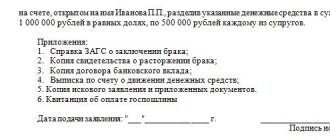Home » Inheritance » Is inheritance considered joint property?
2
In modern realities, an inheritance received is the main opportunity for a valuable acquisition in the form of real estate, land or a vehicle. And it is not surprising that the heir begins to think in advance about his property rights, which can provide him with a decent existence in the future.
For the same reason, there is concern about the composition of jointly acquired property: does it include an inheritance received by one of the spouses during a legal marriage, and is it subject to division upon divorce? The answer to this question cannot be unambiguous. It depends on the regime of common property of the spouses and the presence of special circumstances affecting the regulations established by law.
Improvement
What is meant by improvement? This is an investment of money and labor resources, thanks to which personal property has improved and increased in value.
Example: A wife inherited a dilapidated house from her parents. Due to the lack of other housing, the couple moved into a house for permanent residence. Over the course of several years of living, my husband made significant changes to the house - bricked and tiled, made repairs, replaced electrical wiring, installed communications, installed new windows and doors. Funds from the family budget were used for all this. Equally important were the husband’s special skills and experience, as well as the time and effort he expended. As a result of the improvements, the house's value increased significantly. In case of divorce, the husband can claim it as joint property, despite the fact that the house is the personal property of the wife.
To do this, the man will need to go to court with evidence of the improvements made (investment of finances, time and effort). Such evidence will be checks, contracts, receipts, witness statements, photographs, etc. (see “Division of property acquired before marriage”).
Treaty regime
The contractual regime of common marital assets comes into force from the date of registration of marriage, on the basis of an agreement concluded between husband and wife before or after the legalization of their relationship. This agreement regulates the property rights of each spouse, both present and future (or at choice).
According to the content of the agreement, the status of the inherited property can also be changed - it is strictly determined by its legal owner or, conversely, classified as common property.
An important criterion is the legal significance of the document, which is possible only under the following conditions:
- notarization;
- capacity of both parties;
- free expression of the spouses when determining the content and concluding an agreement;
- the absence of illegal provisions and clauses taking into account the human dignity and marital status of any of the parties;
- presence of personal signatures of husband and wife.
The provisions established by the contract can be canceled only by mutual agreement.
Marriage contract and property division agreement
By default, legal provisions apply. But this does not mean that spouses do not have the right to independently regulate their intrafamily property relations.
Marriage contract
No one forbids a husband and wife to enter into a marriage contract, which establishes a regime of joint ownership of everything that will be acquired during marriage, including as a gift and by inheritance.
If spouses enter into a marriage contract (even before marriage or already during marriage) with such content, then the property received by one of them by inheritance ( and not only that which has already been received, but also that which will be received in the future ) - general. This means that it is subject to division (Article 42 of the RF IC).
Agreement
The same applies to an agreement on the division of property, which a husband and wife can enter into during marriage (for example, already at the stage of divorce) or after divorce. In the agreement, they can determine that the apartment (house, car, etc.) inherited by the husband or wife is common and is subject to division. Read about this in the articles “Agreement on the division of a mortgaged apartment” and “Agreement on the division of a land plot during a divorce”).
The only difference between an agreement and a prenuptial agreement is that the agreement applies only to property that already exists and does not apply to property that may be acquired in the future.
Resale of inheritance
There is a third option, when the inheritance will be considered joint property.
To make it clear, let's consider a real-life situation.
Example: A wife inherited her grandmother’s apartment. After some thought, she decided to resell it and spend the proceeds on a car and a garden house in the Moscow region. Her husband supported her decision. The inherited apartment was sold, the couple got a car and a garden house. But after 4 years the relationship deteriorated and there was a divorce. The initiator was the husband. He filed a claim for division of property, where he indicated the car and garden house as jointly acquired property. The wife protested. Like, how is it possible - “if the property was acquired with money from the sale of an inheritance?” The court demanded evidence, but for 4 years the wife did not keep any checks or receipts. As a result, it turned out that the car and the house were recognized as the joint property of the spouses. The husband received exactly half of the assets. Although in fact the car and house were bought with the wife’s money from the inheritance she received. If she had not sold her grandmother's apartment, there would have been no problems. In this case, the living space would remain with the wife - as inherited property.
Thus, if an inheritance was received during marriage, but the spouse resold it and spent the proceeds on family needs, the assets can be classified as jointly acquired property. The second spouse has a chance of 1/2 of this property. To avoid such disputes during a divorce, you need to keep checks, receipts, contracts and other evidence of the transaction.
The division of jointly acquired property, including inheritance, occurs in court. Either spouse can file a claim for division of marital property. Read about where and how division occurs in the article “How property is divided during a divorce.”
Inheritance of property by will
If the deceased left a will, then it is necessary to dispose of his property following the rules of the document. The terms of the will are paramount and are not subject to consideration. The inheritance will be divided according to the order prescribed in the will, but the notary will have to verify the validity of the will. With the help of special inquiries, the lawyer will find out whether the will was canceled or re-registered.
There are certain exceptions to this rule for drawing up a will, according to which the testator can never deprive the following citizens of a share of the inheritance:
- minor children;
- pensioners;
- disabled parents or spouse;
- incompetent individuals;
- dependents.
This rule is a state regulation and therefore cannot be challenged in court proceedings.
Consulting and legal support
As we can see, dividing inherited property between spouses is difficult, but possible. Before starting this whole long process, it is useful to talk with a lawyer. He will study the situation, documents and give his forecast regarding the real prospects of the case.
If necessary, a lawyer for inheritance and family disputes will draw up a statement of claim and represent the interests of one of the spouses in court hearings. At the same time, the specialist will operate not only with the norms of legislation, but also with the current judicial practice of the Supreme Court and other authorities.
A lawyer is also necessary when the case of division of property is already being considered in an appeal or cassation. After familiarizing yourself with all the materials, a specialist may have a completely different legal position on the essence of the dispute.
If the heirs are both spouses
There are situations when partners inherit property, for example, a house, in equal or different shares. This situation is no different from the previous one. Property is registered personally for each person. It is not divided during a divorce if a legal regime is in effect.
The algorithm of actions is as follows:
- After the right has arisen, each of the partners registers their property separately.
- At the same time, the spouse cannot claim the share. When determining property rights, the following is done:
- will of the testator;
- law.
- The severance of family ties does not in any way affect the partners' holdings. Everyone gets their share.
If the inheritance is sold by both, and the funds are invested in other property, then it is divided in proportion to the contribution (it is better to draw up an agreement).
For information: the described rules apply in Ukraine in the same manner. Law enforcement practice shows that the changes affected only the arrangement of articles of legislation, but not their fundamental content.
Example 2
The Krivenko couple have been married for 15 years. During this time, the husband inherited a house and land in the village from his father, and the wife inherited part of the apartment from her parents. The couple had their own home. They sold the inheritance and opened a small business with this money:
- The investments were not reflected in the charter. However, in practice they were evenly divided.
- The business turned out to be successful. It developed progressively and brought in good income.
- A case was registered against the husband.
- After a certain time, the man decided to leave his wife. At the same time, he offered to leave her the apartment and take the business for himself.
- The woman felt sorry for the efforts invested in the development of the business.
- At the trial, she proved that she initially invested funds received from the sale of the inheritance into the creation of the enterprise.
- The court decided to divide the enterprise into two or pay the woman half of its value.
Attention: inherited intellectual property is not subject to division. When drawing up a voluntary agreement, it is possible to transfer part of the income from her to the former partner, but not herself
Next Property Living wage for a large family in 2020
In what cases is an inheritance considered jointly acquired?
There are two legal acts regulating the rights to property. The Civil Code of the Russian Federation contains references to the fact that inheritances are not a jointly acquired share of property. In terms of use during the existence of families, this is clear. Commonly acquired property is considered to be items purchased with common money. Whether inheritances should be considered as such is stipulated in another law - the Family Code. There are also references to what is considered an undivided share of property in a divorce.
This article indicates certain shares of property that fall under the category of common (acquired by joint efforts):
- Salaries, other official and unofficial income.
- Pensions, subsidies, social payments and subsidies.
- Purchased (acquired) things, apartments, houses, dachas, garages.
- Cars, motorcycles, any vehicle.
- Shares of enterprises, share payments, capital investments.
- Savings acquired in cash and lying in bank accounts.
- Obligation to repay loans, mandatory payments.
- Debt obligations to mortgage lenders.
- Business, if the spouse is a co-owner (owner) of the company.
Inherited property is subject to division if special conditions are met. What matters is the entry period, maintenance and repair costs, etc. A judge considers many facts and factors when making a decision and making a ruling. But all this makes sense only if people are officially married. Civil families do not have common values.
According to civil law, there are no agreements binding people who no longer want to live together. When dividing, it is taken into account how much each person paid for the disputed property. The calculations include the amount of wages, etc. And if the wife is not employed, but is a housewife or raising children, it is generally accepted that they have the same share and the claims are equal.
When can an ex-husband/wife not claim a share?
There are exceptional cases when during married life the value of property received as an inheritance was significantly increased. There is a caveat here if both spouses took an active part in this process.
For example, a wife inherited an apartment. It was in terrible condition and had not seen repairs for ten years. Through joint efforts they brought it into divine shape: they installed expensive plumbing fixtures, remodeled it, and did a high-quality finish.
All work was carried out not independently, but with the involvement of a team of professional workers, whose labor was paid from the joint budget. In this case, the second spouse, who also invested his own money in the renovation, has the right to a share in this property.
For a positive court decision, it is necessary to provide checks and receipts, by which one could judge the cost of repairs and the size of its contribution.









